|
 The air was clammy cold. The sky the color of granite, a western wind brought with
it a drizzling rain. As I drove across the moor, a fine mist cloaked the surrounding
hills, called tors by the Cornish. The wind came in gusts. A somber feeling of
mystery penetrated to my very bones. The air was clammy cold. The sky the color of granite, a western wind brought with
it a drizzling rain. As I drove across the moor, a fine mist cloaked the surrounding
hills, called tors by the Cornish. The wind came in gusts. A somber feeling of
mystery penetrated to my very bones.
Not much has changed here on the moors of the Cornwall
since Daphne du Maurier penned her famous novel, Jamaica Inn, from her
room in the establishment of the same name. She wrote of corruption and
smuggling during the early 19th century. As I look out over the moors, I
can almost hear the wheels of her heroine Mary Yellan's coach creak and
groan as they sank into the ruts of the high road. Mud splattered up
against the windows, where it mingled with the driving rain, and
whatever view Mary had of the countryside was hopelessly obscured.
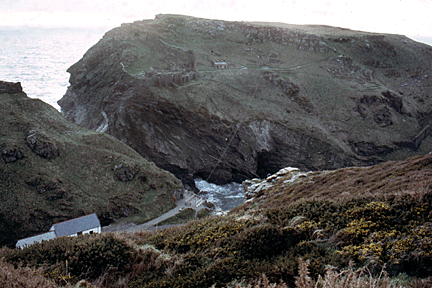 Unlike Mary, I have a heater to keep me dry and warm in my Ford Fiesta
and windshield wipers to push away the rain. Nonetheless, my view of the
moors is bleak and desolate as I make my way
up the high road. Ahead of me, on the crest of a hill, stands a dark
gray slate building with tall chimneys. There's no other house or
cottage in sight. This is Jamaica Inn, standing
all alone in its glory, as it had since it was built 400 years
ago. While Mary Yellan arrived in the dead of night and had to hammer on
the door to gain entrance from her wicked uncle, I have
only to park my car and push open the door into the cozy bar and
restaurant. Unlike Mary, I have a heater to keep me dry and warm in my Ford Fiesta
and windshield wipers to push away the rain. Nonetheless, my view of the
moors is bleak and desolate as I make my way
up the high road. Ahead of me, on the crest of a hill, stands a dark
gray slate building with tall chimneys. There's no other house or
cottage in sight. This is Jamaica Inn, standing
all alone in its glory, as it had since it was built 400 years
ago. While Mary Yellan arrived in the dead of night and had to hammer on
the door to gain entrance from her wicked uncle, I have
only to park my car and push open the door into the cozy bar and
restaurant.
The house and outbuildings form three sides of a cobblestone yard, in
the center of which is an old drinking trough. Beyond this lies the
road, a thin white ribbon that stretches on either
hand to the horizon, surrounded on each side by moorland.
Mary Yellan had traveled by coach no more than forty miles over several
days from her home in Helford, while I had just traveled nearly twice
that amount in under two hours from my previous
night's stay at the Royal Clarence Hotel in Exeter. Today, a sparkling
four-lane highway, the A30, traverses Cornwall,
taking British summer vacationers from their
homes in London to the beaches in the west.
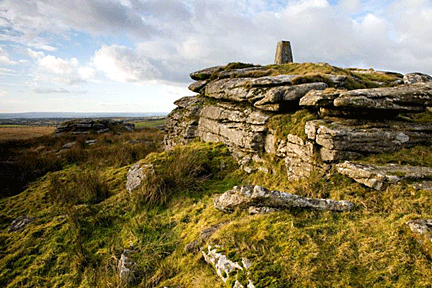 Cornwall is virtually an island, cut off from the rest of England by the
River Tamar. It was in the early 19th century that the first trickle of
genteel "excursionists" arrived with their easels and watercolors, but
the earliest visitors were made of sterner stuff--Phoenicians, came to
barter wine and olive oil for precious tin, Celts brought Christianity,
peppering the landscape with castles to defend their faith. Virtually
untouched by Roman occupation, Celtic rule lasted until the 8th century
when the English overran the land. Even so, the Cornish language
survived until Tudor times and in remote districts Cornish speakers
could still be found in the late 18th century. Cornwall is virtually an island, cut off from the rest of England by the
River Tamar. It was in the early 19th century that the first trickle of
genteel "excursionists" arrived with their easels and watercolors, but
the earliest visitors were made of sterner stuff--Phoenicians, came to
barter wine and olive oil for precious tin, Celts brought Christianity,
peppering the landscape with castles to defend their faith. Virtually
untouched by Roman occupation, Celtic rule lasted until the 8th century
when the English overran the land. Even so, the Cornish language
survived until Tudor times and in remote districts Cornish speakers
could still be found in the late 18th century.
The sea is all around. In Cornwall, the waves still snatch the unwary
and the foolhardy from rock-faces, still batter and shrink the
rock-faces themselves. Faced with the eternal sea, time shrivels away.
As I look out upon the landscape, it's a different world from the one I
had seen only a day's journey back. How remote the shopping centers and
busy streets of Exeter seem. The rain is now a
lashing, pitiless downpour that stings the windows of my room. There are
no trees here, save one or two that stretch bare branches to the four
winds, bent and twisted from centuries of
storm. This is a scrubby land, without hedgerow or meadow, a country of
stones, black heather and stunted broom.
Later, as I stand on Bodmin Moor looking north from the Jamaica Inn, I
see a part of England not yet reached by electricity. Oil lamps and
generators light the few scattered homesteads, remote in a landscape
traversed by drovers' tracks made centuries ago. Here the solemn
isolation of Bodmin Moor prevails still as du Maurier depicted it.
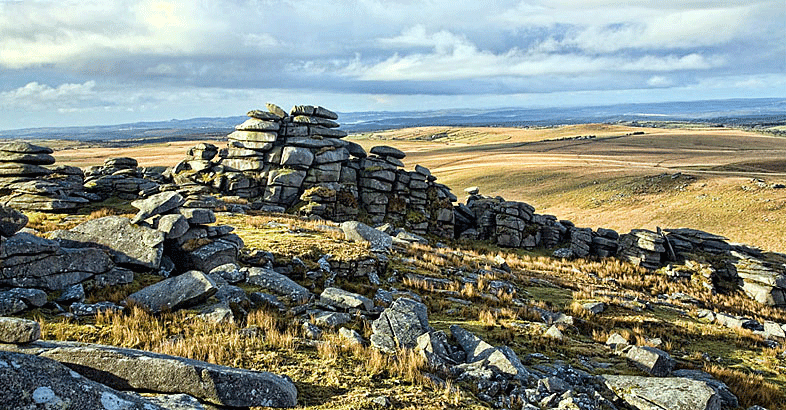
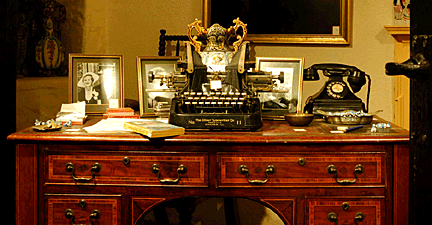 Daphne du Maurier loved Cornwall. When she died in 1989, some of her
belongings were brought here to re-create her study. I can understand
the popularity of the place--an oasis on Bodmin for four hectic months
between May and August. For the rest of the year, the inn, like all of
Cornwall can be enjoyed at leisure without the crowds. Daphne du Maurier loved Cornwall. When she died in 1989, some of her
belongings were brought here to re-create her study. I can understand
the popularity of the place--an oasis on Bodmin for four hectic months
between May and August. For the rest of the year, the inn, like all of
Cornwall can be enjoyed at leisure without the crowds.
Today, the inn's six bedrooms, each named after a du Maurier villain,
are pleasantly furnished and equipped with the latest amenities. "Harry
the Peddler" has a miniature dressing room, while "Squire Bassett" has
the ghost of an old sailor in a tricorn hat who disappears into the
wardrobe! Naturally, the bar is full of atmosphere and some rather
alarming-looking characters kept in order by Percy, a 40-year-old blue
parrot.
 To the west of Jamaica Inn high tors rear their heads, some are smooth
like downland, with yellow-green grass shining under a fitful springtime
sun. But others are austere and sinister, their
peaks crowned with granite and great slabs of stone. To the west of Jamaica Inn high tors rear their heads, some are smooth
like downland, with yellow-green grass shining under a fitful springtime
sun. But others are austere and sinister, their
peaks crowned with granite and great slabs of stone.
Now and again the sun is obscured by a cloud and long shadows flee over
the moors like fingers. Color comes in patches, sometimes the hills are
purple, ink-stained, and mottled, and then a feeble ray of sun comes
from behind a wisp of cloud and one hill glows light green, while
another languishes in the dark.
The scene is never the same, for it can be high noon in the east, with
the moor as motionless as desert sand, and to the west arctic winter
falls upon the hills, brought on by a jagged cloud
shaped like a highwayman's cloak. The air is strong and sweet
smelling, cold as the mountains and strangely pure. However grim and
sullen this country, it spurred me on to adventure.
The road across the moor to Dozmary Pool, the legendary lake into which
King Arthur's sword Excalibur was thrown, descends into a deep gully,
the side banks so high I can't see over them. Now and again, I'm offered
a look beyond through a dip in the bank, but mostly it's mile after mile
of tunnel vision through the mysterious landscape. The high banks give a
false feeling of shelter in contrast to the bleak wilderness of the
moors.
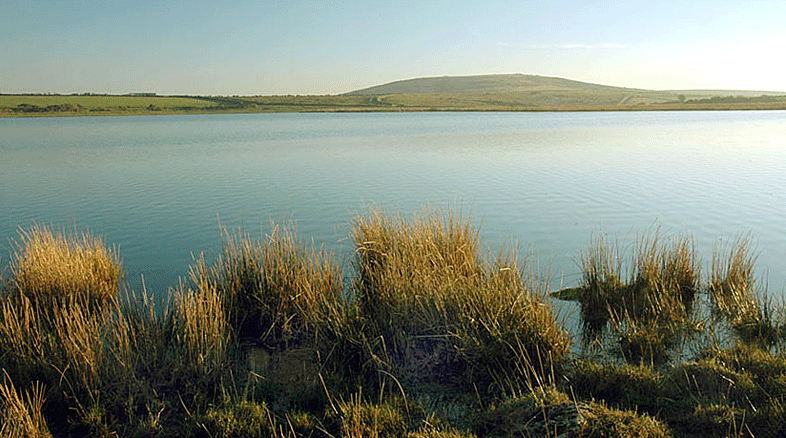
A wall of fog closes in around me, obscuring the distant tor. I have to
slow my pace to a crawl following the narrow road. The cliffs descend
sharply to the sea. The banks of the road muffle the sounds of the
breakers.
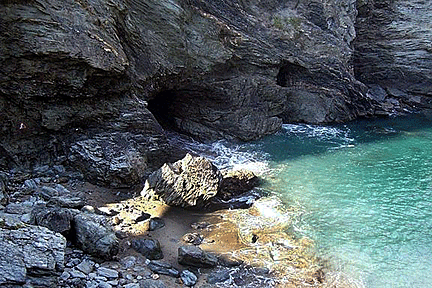 The treacherous coasts of Cornwall are notorious for wrecks. The local
people didn't hesitate to ransack a ship unfortunate enough to be
smashed on the rocks. Gangs of unsavory men used to
huddle against the jagged rocks that broke the expanse of beach
waiting to prey on the helpless ships. A small white star of light shone
from the headland, winking bravely in the night. This
star was a false light placed there by marauding bands to lead
the unweary ships onto the rocks where they would break up emptying
their precious cargo into the rolling surf. The treacherous coasts of Cornwall are notorious for wrecks. The local
people didn't hesitate to ransack a ship unfortunate enough to be
smashed on the rocks. Gangs of unsavory men used to
huddle against the jagged rocks that broke the expanse of beach
waiting to prey on the helpless ships. A small white star of light shone
from the headland, winking bravely in the night. This
star was a false light placed there by marauding bands to lead
the unweary ships onto the rocks where they would break up emptying
their precious cargo into the rolling surf.
One story relates how the vicar of the parish church in Portemouth was
drawing to the end of a particularly dry sermon, and many of his
congregation had dozed off. The sound of someone
opening the church door woke a few of them—a gale was blowing
outside—and they welcomed the diversion as he walked up to the pulpit
and whispered in the vicar's ear. The remainder of the
congregation was immediately roused from their musings by the
vicar bellowing, "there's a ship ashore between Prawle and Pear Tree
Point!" He began to tear off his vestments, continuing as he tugged at
the encumbering garments, "...but let us all start fair." As one, the
congregation stood up and charged headlong to the beach with the vicar
in the lead.
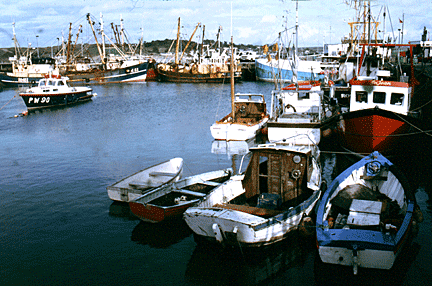 Turn back the clock 200 years and picture this: a storm-tossed, moonless
night, waves crashing against the harbor wall. At sea a flashing lantern
and on shore a Customs man on the rampage,
determined to catch smugglers redhanded. Drenched to the skin he beats
on the door of Tamarisk cottage, the clifftop home of two likely
villains, but all in vain. For while he demands
entry in the name of the King, the two lads stealthily make their
way up from the beach by means of a tunnel that comes out in the cottage
bedroom. Turn back the clock 200 years and picture this: a storm-tossed, moonless
night, waves crashing against the harbor wall. At sea a flashing lantern
and on shore a Customs man on the rampage,
determined to catch smugglers redhanded. Drenched to the skin he beats
on the door of Tamarisk cottage, the clifftop home of two likely
villains, but all in vain. For while he demands
entry in the name of the King, the two lads stealthily make their
way up from the beach by means of a tunnel that comes out in the cottage
bedroom.
While most Cornish natives are fishermen, some have also been smugglers
on the side when times weren't so good.
Cornishmen of the 18th century in particular held an ineradicable belief
in duty-free trade, and went to extraordinary
lengths of craftiness and bravery to bring in contraband without paying
for it—the smuggling museum at Polperro bears witness as to how.
Polperro, in southeast Cornwall, is a village of contrasts. Approached
from the cliffs, it's easy to imagine what the charming port was like
when it was a favorite landfall of smugglers of lace, brandy, and tea.
The harbor area survives almost intact, surrounded by white and
pastel-painted houses looking out across the water.
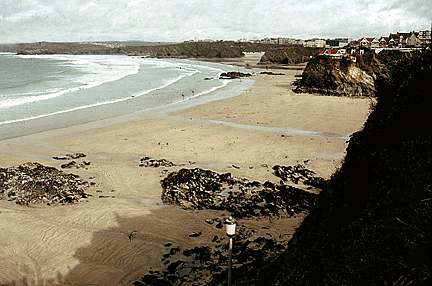 There's a colorful legend here of "Battling Billy" who ran the Halfway
House Inn. Faced with the perennial problem of transporting kegs of
brandy inland without being detected by the
customs officials, he hit on the idea of using a hearse. The ruse worked
well for a while, but Billy ran into trouble when one cargo had to be
unloaded by daylight. Just as the last keg was being pushed into the
hearse, the revenue men arrived, and Billy whipped the horses into a
ferocious gallop, shouting back, "If they shoot me dead, my body'll
drive the load to Polperro." There's a colorful legend here of "Battling Billy" who ran the Halfway
House Inn. Faced with the perennial problem of transporting kegs of
brandy inland without being detected by the
customs officials, he hit on the idea of using a hearse. The ruse worked
well for a while, but Billy ran into trouble when one cargo had to be
unloaded by daylight. Just as the last keg was being pushed into the
hearse, the revenue men arrived, and Billy whipped the horses into a
ferocious gallop, shouting back, "If they shoot me dead, my body'll
drive the load to Polperro."
According to the story, this is precisely what happened, a bullet went
clean through Billy's neck, so that his head hung limp and lifeless, but
his whip-hand continued to urge the horses on.
When they reached Polperro, the dead man drove straight down the main
street, off the quayside and into the harbor. Battling Billy's ghost
still haunts the narrow cobbled streets.
 Smugglers seeking a more discreet approach headed further east to Looe,
and brought goods ashore on Looe Island. Various stories about
inhabitants of the island--one names them as Hamram and his daughter Tilda.
Another makes them brother and sister—Fyn and Black Joan, who moved to
the island from Mewstone after their outlaw father died near Plymouth.
They were said to have eaten every rat and rabbit on the island. Once a
picnic party on the island rushed into a barn for shelter from a storm
and fell through the floor into a hidden cache of spirits. Smugglers seeking a more discreet approach headed further east to Looe,
and brought goods ashore on Looe Island. Various stories about
inhabitants of the island--one names them as Hamram and his daughter Tilda.
Another makes them brother and sister—Fyn and Black Joan, who moved to
the island from Mewstone after their outlaw father died near Plymouth.
They were said to have eaten every rat and rabbit on the island. Once a
picnic party on the island rushed into a barn for shelter from a storm
and fell through the floor into a hidden cache of spirits.
Inns were often haunts. In West Looe, at the Ye Olde Jolly Sailor, a
quick thinking landlady concealed an illicit keg beneath her petticoats
during an unexpected raid. While the officials
searched, she calmly knitted.
Northwest of Looe as the crow flies is the tiny hamlet of Tintagel,
dramatically perched on grass-covered cliffs above the Atlantic Ocean on
the opposite side of the Cornish peninsula. A
quiet town where the sound of deep-throated gulls fills the air, it's
known for Tintagel Castle, the site of King Arthur's birth. Cows stand
silently in a field across from Trebrea Lodge, a 16th-century manor
house now a bed and breakfast and my
home for the night.
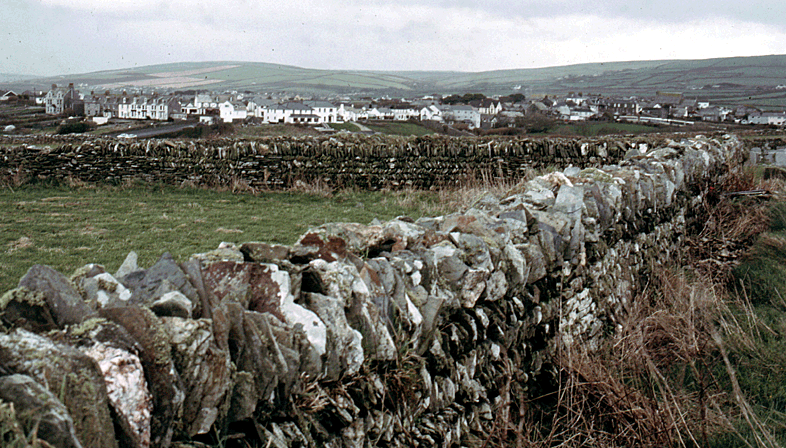
The next day dawned late and drizzly. It was after eight by the time a
watery sun peeped over the horizon of the harbor of Port Issac, a few
miles south of Tintagel. The sun's pale rays
glinted on the fishing fleet as it bobbed and tossed, confined to port
by a gale that changed slate-grey skies to azure and back again in
barely the time it took a herring gull to cross the bay.
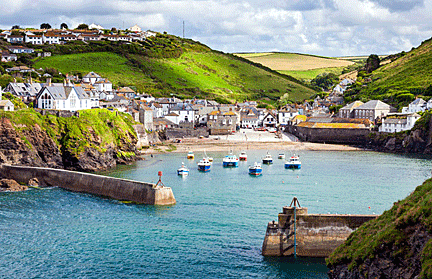 Port Issac is the quintessential Cornish fishing village. Tiers of
cottages rise higgledy-piggledy up the cliff-face, linked by a series of
gravity-defying alleys known as "drangs," some, such as "Squeeze-Belly
Alley," aptly named. At low tide the harbor doubles as a car park: "Mind
you don't forget the time," the attendant calls after me, "if you do,
you'll find your motor has taken to the high seas." Port Issac is the quintessential Cornish fishing village. Tiers of
cottages rise higgledy-piggledy up the cliff-face, linked by a series of
gravity-defying alleys known as "drangs," some, such as "Squeeze-Belly
Alley," aptly named. At low tide the harbor doubles as a car park: "Mind
you don't forget the time," the attendant calls after me, "if you do,
you'll find your motor has taken to the high seas."
Chief among the resorts on this breathtaking stretch of coastline is
undoubtedly Newquay, which from majestic cliffs looks down on acres of
firm, golden sands. Once the ecclesiastical captial of Cornwall,
historic Padstow retains its appeal as one of the few harbor havens
between Newquay and the 16th-century quay of Boscastle.
Further down the coast, the fishing port of St. Ives now sports
galleries and studios of its art community that stand cheek by jowl with
the stone, slate-roofed cottages of fisherfolk. Generations of
artists—Turner, Whistler, Nicholson and Hepworth—have been captivated by
the translucent Cornish light and immortalized the landscape. Today, the
tradition carries on with the recent opening of the new Tate Gallery,
sister to the famous London art gallery.
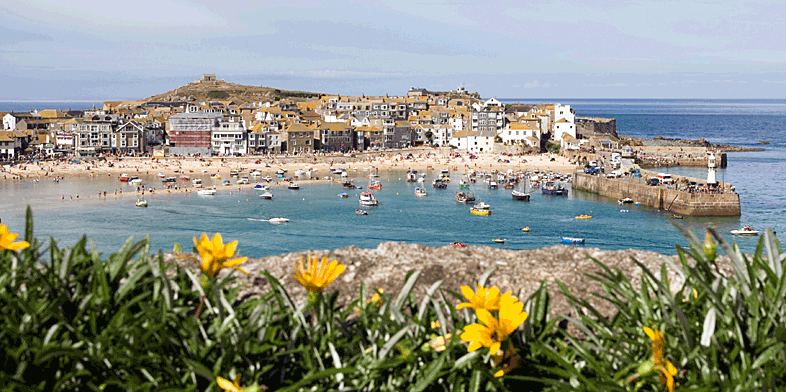
It's a known fact that just about everyone in the town bought and sold
illegal goods. The Blue Bell Inn, frequented by a Dutch smuggler named
Hans Breton, once stood on St. Andrews Street.
It's said that he was in a league with the devil, and that he paid duty
on just one keg of brandy. This, however, never seemed to empty, and
lasted 22 years!
Another local story, tells how a farmer, near the village of Padstow,
spotted carrying a barrel of spirits by an exciseman, lifted a gatepost
from its socket, dropped the tub into the hole,
replaced the gatepost and greeted the man with a cherry wave.
At Land's End, the rugged coast turns along granite cliffs to Mousehole,
razed by Spanish privateers in 1595. It dips and turns past the busy
port of Penzannce to Mounts Bay where, as
legend has it, a giant created St. Michael's Mount.
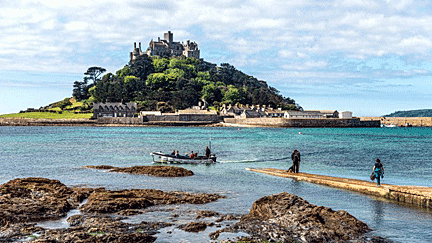 St. Michael's Mount, more than any other spot, holds the magic of this
kingdom, uneasy and triumphant, cheerful and terrifying. It's a towering
rock island linked by a half-tide causeway to the little town of
Marazion. It has served as a bulwark and a holy refuge, as Benedictine
monks spent 400 years here in prayer. St. Michael's Mount, more than any other spot, holds the magic of this
kingdom, uneasy and triumphant, cheerful and terrifying. It's a towering
rock island linked by a half-tide causeway to the little town of
Marazion. It has served as a bulwark and a holy refuge, as Benedictine
monks spent 400 years here in prayer.
A few miles further east I find deep ruts cut into the stone by the
smuggler's carts at Prussia Cove, most famous of all Cornwall's
smuggling haunts. Access to the cove, itself, is only by foot. It was
supposedly the haunt of John Carter, an 18th-century smuggler who styled
himself as the "King of Prussia."
And all this western raggedness, as those who travel it know, is magic
country. It can't help it. Saints and artists and desperadoes have all
been drawn to these uttermost edges of the rocky west of England. Forget
politics. The fact is that when I crossed the border into Cornwall, I
was outside England, almost outside Britain. I was in another country.
No, I never did get a grip on Cornwall, not really. I guess I was never
meant to. It's a mysterious place, filled with stories of adventure,
built on shifting sands.
<
Back to
History Articles
Go to next History article >
|
